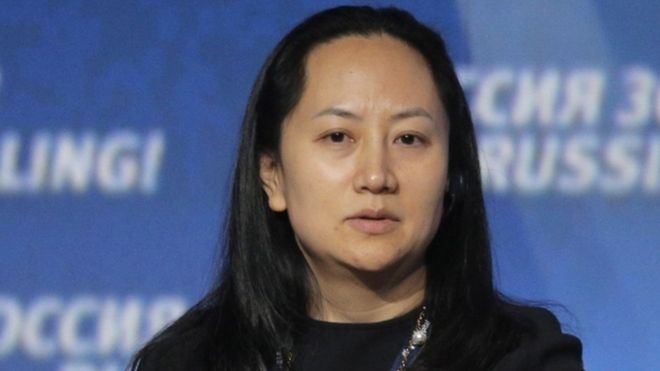Huawei executive arrested in Canada

Canadian authorities have arrested the daughter of the founder of Chinese telecoms giant Huawei at the request of US law enforcement.
Meng Wanzhou, who is Huawei's chief financial officer and deputy chair, was arrested in Vancouver on 1 December, Canada's Department of Justice said.
Ms Meng is being sought for extradition by the US, the department added.
Huawei said it had little information about the charges and was "not aware of any wrongdoing by Ms Meng".
Ms Meng, daughter of company founder Ren Zhengfei, was detained while transferring between flights, the firm said.
She will face a bail hearing on Friday, a spokesman for Canada's Department of Justice said.
He declined to say more about the case, citing a publication ban requested by Ms Meng and ordered by the courts.
'Just conclusion'
US media have reported that Huawei is under investigation for potential violations of US sanctions against Iran.
US lawmakers have also repeatedly accused the company of being a threat to US national security, arguing that its technology could be used for spying by the Chinese government.
In a statement, Huawei said it complied with "all applicable laws and regulations where it operates, including applicable export control and sanction laws and regulations of the UN, US and EU.
"The company believes the Canadian and US legal systems will ultimately reach a just conclusion."
China's embassy in Canada issued a statement saying that at the request of the US, Canada had arrested a Chinese citizen "not violating any American or Canadian law".
"The Chinese side has lodged stern representations with the US and Canadian side, and urged them to immediately correct the wrongdoing and restore the personal freedom of Ms Meng Wanzhou," it added.
A spokesman for the US Justice Department in the Eastern District of New York - which Huawei said had brought the charges - declined to comment.
The arrest comes as the US has brought a number of legal cases against Chinese technology firms, with accusations such as cyber-security theft and violations of US sanctions against Iran.
Earlier this year, it barred US companies from exporting to Chinese telecommunications firm ZTE over violations of the Iranian sanctions, effectively shutting down the firm.
The US later replaced the ban with a fine and governance changes.
